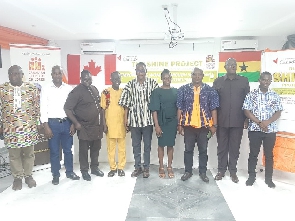 Some stakeholders at the launch of the project
Some stakeholders at the launch of the project
Mr. Augustine N-Yokuni, the Country Director of Canadian Feed the Children (CFTC), has called on stakeholders to support development projects in the Upper East region. He said the organisation’s flagship programme, dubbed; “Sustainable Development Human Rights Inclusion and Equality (SHINE),” needs to be supported to enhance living standards. The three-year project would be implemented in 16 communities across four municipalities and districts in the region. The project seeks to enhance women's and girls’ empowerment through the implementation of sustainable agriculture and agribusiness-related activities in the Bolgatanga and Kassena-Nankana municipalities, and the Bongo and Talensi districts. Mr. N-Yokuni, at the launch of the SHINE project in Bolgatanga, said it would be implemented in partnership with TradeAid Integrated, a Non-Governmental Organisation. Chief executives from the beneficiary municipalities and districts, and officials from the Ministry of Food and Agriculture among others attended. The project was built on the Global Affairs Canada’s Feminist International Assistance Policy and received one million Canadian Dollars from Global Affairs, Canada. He said the CFTC, a charitable organisation, worked in five countries including Ghana, Bolivia, Ethiopia, Uganda, and with indigenous peoples and communities in Canada. Through its local partners, the CFTC had delivered development programmes with positive, meaningful, and sustained impacts on children’s lives and built the resilience of their families and communities. “In Ghana, it works through three local organisations namely Regional Advisory Information and Network Systems, TradeAid Integrated, and Tumu Deanery Rural Integrated Development Programme, which implement long-term programmes and projects in Northern, Savannah, Upper East, and Upper West regions,” Mr N-Yokuni said. The African Agribusiness Incubators Network was a technical partner to the project, he said, and that business incubation was a key component. The policy recognised the need to support gender equality and for a more peaceful, inclusive, and prosperous world. “The new dimension to this project is the business incubation and its prospects on the lives of women and girls in northern Ghana,” Mr N-Yokuni said. He emphasised the need for long-lasting women empowerment that enhances access to productive resources for sustained production, increased value-chain development, marketing and business skills. Mr. Nicholas Apokerah, the Executive Director, TradeAid Integrated, said the project was estimated to benefit 8,000 people in the 16 communities and expressed gratitude to Canadian Feed the Children for its partnership with his organisation to improve the living standards of the people.
Mr. Augustine N-Yokuni, the Country Director of Canadian Feed the Children (CFTC), has called on stakeholders to support development projects in the Upper East region. He said the organisation’s flagship programme, dubbed; “Sustainable Development Human Rights Inclusion and Equality (SHINE),” needs to be supported to enhance living standards. The three-year project would be implemented in 16 communities across four municipalities and districts in the region. The project seeks to enhance women's and girls’ empowerment through the implementation of sustainable agriculture and agribusiness-related activities in the Bolgatanga and Kassena-Nankana municipalities, and the Bongo and Talensi districts. Mr. N-Yokuni, at the launch of the SHINE project in Bolgatanga, said it would be implemented in partnership with TradeAid Integrated, a Non-Governmental Organisation. Chief executives from the beneficiary municipalities and districts, and officials from the Ministry of Food and Agriculture among others attended. The project was built on the Global Affairs Canada’s Feminist International Assistance Policy and received one million Canadian Dollars from Global Affairs, Canada. He said the CFTC, a charitable organisation, worked in five countries including Ghana, Bolivia, Ethiopia, Uganda, and with indigenous peoples and communities in Canada. Through its local partners, the CFTC had delivered development programmes with positive, meaningful, and sustained impacts on children’s lives and built the resilience of their families and communities. “In Ghana, it works through three local organisations namely Regional Advisory Information and Network Systems, TradeAid Integrated, and Tumu Deanery Rural Integrated Development Programme, which implement long-term programmes and projects in Northern, Savannah, Upper East, and Upper West regions,” Mr N-Yokuni said. The African Agribusiness Incubators Network was a technical partner to the project, he said, and that business incubation was a key component. The policy recognised the need to support gender equality and for a more peaceful, inclusive, and prosperous world. “The new dimension to this project is the business incubation and its prospects on the lives of women and girls in northern Ghana,” Mr N-Yokuni said. He emphasised the need for long-lasting women empowerment that enhances access to productive resources for sustained production, increased value-chain development, marketing and business skills. Mr. Nicholas Apokerah, the Executive Director, TradeAid Integrated, said the project was estimated to benefit 8,000 people in the 16 communities and expressed gratitude to Canadian Feed the Children for its partnership with his organisation to improve the living standards of the people.